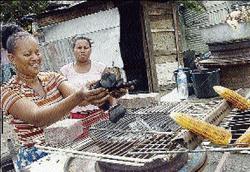Latoya Grindley, Features Writer

Food vendors using charcoal stoves at National Heroes Circle in Kingston. - Rudolph Brown/Chief Photographer
Monday to Saturday along National Heroes Circle, you are bound to see crab and corn vendors on the streets ready and waiting for a sale.
They go out as early as 7 o'clock and leave as late as 8 o'clock in the evenings religiously. As soon as they get to their spot in the mornings, the cooking begins.
Crabs and corn are the main specialties and are prepared in a similar way. The crabs are boiled in a pot which is placed over lit wood which create a fire. The corn is boiled on coal stoves, but some are roasted on the stoves to add variety.
Unpredictable sales
Sale are unpredictable and, to keep the items fresh for customers, they are placed on the coal stove at low flame.
"People don't want to buy things to eat when it cold, so we have to constantly have them on the coal to keep them hot," says Marcia 'Bunny' Gregory, a crab and corn vendor.
Because of this, vendors say they have to use one bag of coal (a bag resembling a market bag) per day.
One bag costs between $650 and $700, so, on average, they spend $3,900 per week on charcoal alone.
Gas prices have been escalating and so has fuel like charcoal.
Bunny says earlier this year, she was able to spend $500 or less for a bag of coal. She also says the price of coal is linked to the weather.
"Every time it rain, especially for a long time, they raise it and just before this last increase, we did a pay little less."
Specialising in crabs and corn for more than 12 years, Bunny says she gets coal at the Coronation Market in downtown Kingston. She claims it doesn't take long for one bag of charcoal to diffuse, especially on windy days.
"When it windy, it burn out fast so we have to constantly add coal to keep the things hot."
Cheaper charcoal
With the cost of charcoal going up, the vendors are still adamant that coal is much cheaper than gas.
Alice Waugh, who specialises in crabs, says at home, on average per month, she spends $1,600 to buy cooking gas. At first thought, it would seem as if this would be the cheaper solution to carry out her daily job.
But it's not. Alice says charcoal is much cheaper because of its longevity.
"Remember that we have to constantly have the things on the coal to keep them warm, so if we suppose to use gas, the amount of time we would have to change cylinder woulda be too much because they would be burning from morning 'til night."
Vendors seem to be more content with the charcoal's economy than its health hazards. Bunny says she has not been affected by it as yet, even though she knows it will affect her one day.
Alice hasn't been so lucky though. "The smoke affect my eyes, yes, because I have a eye problem and the doctor say is the smoke cause it," she says, pointing to the redness. Despite charcoal's relative cheapness, none of the vendors uses it at home for cooking purposes.
"Mi caan bother catch nuh coal at home and fi go all smoke up the place," Alice says.
latoya.grindley@gleanerjm.com

